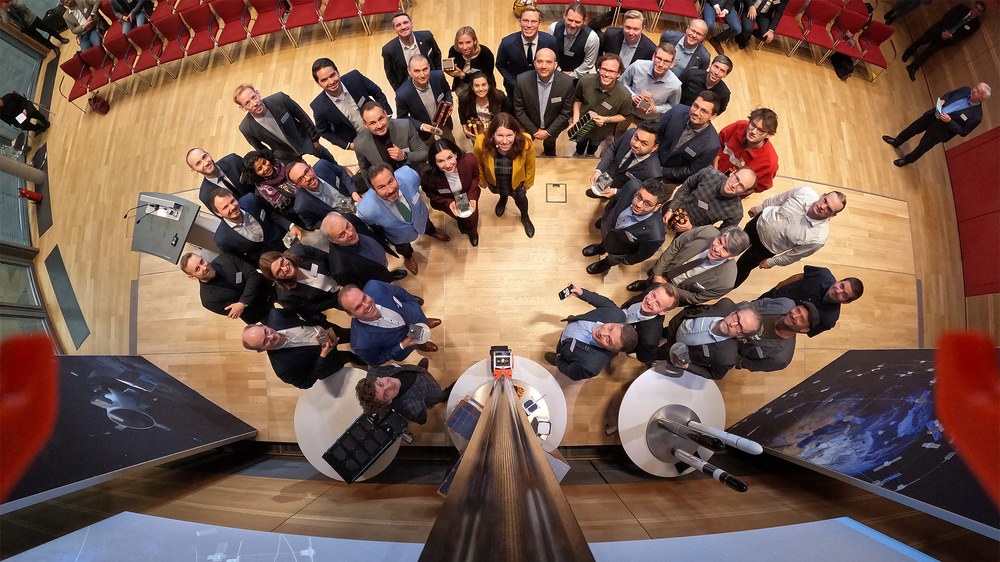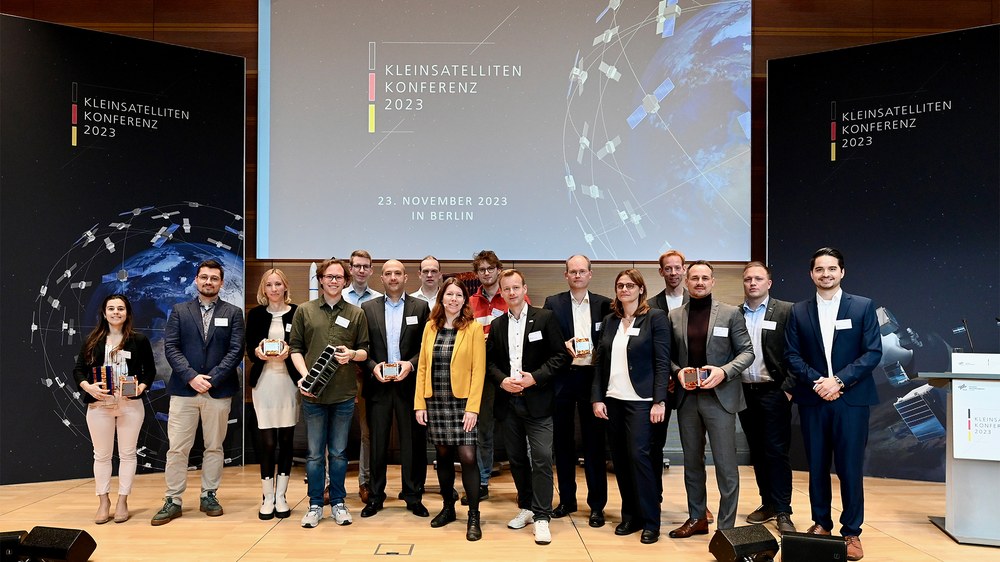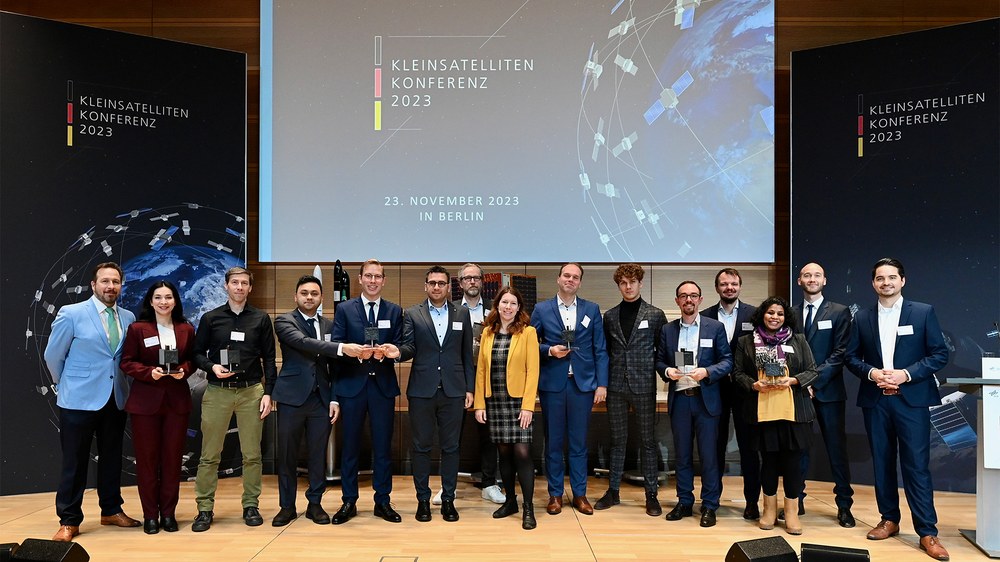Small satellites – winners of three DLR competitions selected



- The German government has launched the 'Small Satellite Initiative' to strengthen the German space industry and promote small and medium-sized enterprises (SMEs) and, in particular, start-ups in the field of small satellites.
- The German Space Agency at DLR has managed three competitions, the winners of which were announced at the 2023 Small Satellite Conference in Berlin on 23 November.
- Small satellites are versatile and can be used flexibly – for telecommunications services, Earth observation and climate research or testing new technologies in space. They can be produced in larger quantities and are therefore more cost-effective and can be manufactured more rapidly than conventional satellites, opening up a wide range of new opportunities for commercial services and science.
- Focus: Spaceflight, commercialisation, New Space, support for SMEs
Small satellites – that is, satellites weighing up to 500 kilograms – are considered a key driver and building block for future space activities, particularly with a view to further commercialisation. They are versatile and flexible and can be used for a wide range of space-based applications and services – from telecommunications, Earth observation and climate research to testing new technologies in space. Small satellites can be produced in larger quantities and therefore more cost-effectively and rapidly than conventional satellites, opening up a wide range of new opportunities for commercial services and science.
On 23 November 2023, the German Space Agency at the German Aerospace Center (Deutsches Zentrum für Luft- und Raumfahrt; DLR) announced the winners of the three competitions that matched the theme of the second National Small Satellite Conference in Berlin – the Microlauncher Payload Competition, the Small Satellite Competition and the Small Satellite Payload Competition. Anna Christmann, a member of the Bundestag and Federal Government Coordinator of German Aerospace Policy, presented the certificates. She emphasised: "I am delighted that we are able to support the expansion of space launch capabilities, the development of small satellites for scientific missions and the testing of new technologies with this initiative. The competitions benefit start-ups and SMEs in particular and thus also put the important New Space focus of our space strategy into practice." The close cooperation between universities and research institutions and industry is also entirely in line with the German government's recently updated space strategy. "We see these competitions as a catalyst and trailblazer for the commercialisation of space activities in Germany and Europe," adds Walther Pelzer, a member of the DLR Executive Board and Director General of the German Space Agency at DLR.
Payloads for the second microlauncher flight have been selected
On 20 June 2022, the German Space Agency at DLR launched the second round of the microlauncher payload competition for zero-cost flights of mini-satellites on small launchers developed and built in Germany. "This time, we were looking for suitable small and micro satellites for the second launch of the RFA One microlauncher from Rocket Factory Augsburg. The application period ended on 30 April 2023 and the winners were selected by 30 June 2023, with institutions from Germany, Bulgaria, Spain and Poland coming out on top with a total of eight small satellites," explains DLR project manager Andres Lüdeke. The payload competition is part of the microlauncher competition organised by the German Space Agency at DLR. The German start-ups Isar Aerospace Technologies GmbH (Spectrum launcher), Rocket Factory Augsburg AG (RFA One) and HyImpulse Technologies GmbH (SL1) were successful in various phases of the microlauncher competition. The two rockets Spectrum and RFA One were selected to carry out a total of four missions. At just 28 and 30 metres in length respectively and two metres in diameter, they are designed to transport payloads weighing up to 1.3 tonnes, making them ideal for launching small satellites.
The winners of the second flight opportunity on the RFA One launcher:
DLR Institute of Materials Physics in Space: The team wants to investigate the 'self-organisation' of structures formed by active, self-propelled microorganisms, referred to as microswimmers, as well as the long-term stability of these assemblies under microgravity conditions.
DLR Institute of Lightweight Systems: The main objective of the mission is to demonstrate the successful deployment and retraction of the 'SpaceMast' camera mast and thus the basic technology of the 'SpaceMast' system in orbit. This is to be recorded by an external camera. In addition, the camera functionality, similar to that of a 'selfie stick' in space, will be demonstrated.
Bremen University of Applied Sciences: The primary mission objective is to characterise mechanical disturbances in orbit with a newly developed measurement system and to suppress their effects on satellite images.
Technical University of Munich – WARR e.V.: The task of this mission is to test the MOVE-BEYOND all-purpose bus system. This bus system is based on a new scalable and flexible approach to accommodate payloads of different types.
Vyoma GmbH: This mission will monitor and track space debris and objects larger than 10 centimetres in diameter. In addition, a dedicated, high-precision catalogue of space debris and objects in low Earth orbit is to be developed and existing catalogues in all orbital regions will be improved.
Warsaw University of Technology (Poland): Technology demonstration of a customised butane warm-gas propulsion system and attitude control algorithms.
EnduroSat (Bulgaria): A technology proving mission (16U platform) with state-of-the-art avionics, a new power supply system and payload computer for on-board processing and novel communication systems on board the platform.
Universitat Politècnica de Catalunya (Spain): 3Cat-8 is a scientific mission to monitor and characterise ionospheric scintillation – that is, the emission of light from a body excited by radiant energy – and to monitor radio frequency emissions in the L- and K-bands.
Small Satellite Competition
In July 2023, the German Space Agency at DLR launched the Small Satellite Competition and the Small Satellite Payload Competition. The small satellite competition aims to provide organisations – be they companies, educational or research institutions – with a small satellite including a payload with a zero-cost launch opportunity on a microlauncher for the year 2025.
The following five German companies are among the winners of this competition:
OroraTech GmbH: This company is manufacturing eight micro-satellites that will fly in formation to monitor forest fires at one-hour intervals using infrared cameras.
TALOS GmbH: The start-up company is producing five micro-satellites for tracking wildlife and livestock as part of the ICARUS project.
Planetary Transportation Systems GmbH: This start-up company is producing three miniature satellites for classifying and processing Earth observation data in space using quantum technology.
Rapid Cubes GmbH: The company uses four micro-satellites to test bi-directional data communication for Internet-of-Things applications in species and nature conservation.
Vyoma GmbH: This start-up company is launching a small satellite for the optical monitoring of space debris in the size range of a few centimetres.
Small Satellite Payload Competition with extra platforms
In addition to a launch opportunity on a microlauncher in 2025, the winners of the Small Satellite Payload Competition will have the opportunity to receive a commercially available small satellite platform for their payload.
The following seven companies are among the winners of this competition:
Marble Imaging GmbH: A multispectral camera will be used to generate high-resolution Earth observation data.
Berlin Space Consortium GmbH: An electric propulsion system for small satellites for orbital manoeuvres and space debris prevention will be qualified.
High Performance Space Structure Systems GmbH: The company will demonstrate a development test in the form of a brake sail to allow a small satellite to re-enter after the end of its mission to prevent space debris.
InSpacePropulsion Technologies GmbH: The qualification of two chemical propulsion systems with green propellants for small satellites for rendezvous manoeuvres and to avoid space debris.
Airbus Defence and Space GmbH: The company will test an electric propulsion system for small satellites that uses an alternative propellant – in this case iodine.
Quantum Galactics GmbH: This start-up company will conduct a development trial of a cyber security test system to prevent the failure of a satellite due to cyber-attacks.
Industrieanlagen-Betriebsgesellschaft mbH (iABG): The company is developing an AI payload that ensures the resilience of AI models directly on the sensor or satellite.
